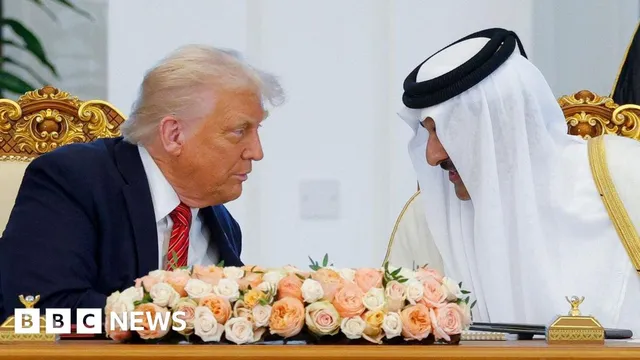
Trump set to accept $400 million luxury jet gift from Qatar
2025-05-15 09:20- President Trump is set to accept a luxury Boeing 747-8 from Qatar.
- The aircraft is planned to serve as Air Force One during his presidency.
- This unprecedented gift raises legal concerns regarding foreign emoluments.
Express your sentiment!
Insights
In recent days, President Donald Trump has prepared to accept a luxury Boeing 747-8 jumbo jet from the royal family of Qatar. This aircraft, known for its opulent configuration, is intended to serve as the new Air Force One during Trump's presidency. The Qatari government has been working closely with Trump, especially following his support for a boycott against Doha by several Arab nations in his first term. The plans for the gift are expected to be publicly announced during Trump's upcoming trip to the Middle East, which includes stops in Saudi Arabia and the United Arab Emirates. The administration's acceptance of this substantial gift has raised legal concerns, particularly related to the Foreign Emoluments Clause of the U.S. Constitution, which prohibits government officials from receiving gifts from foreign nations without congressional approval. Despite this, sources indicate that lawyers from the White House counsel's office and the Department of Justice have determined that accepting the aircraft as a gift is legal. They argue that the aircraft will initially be transferred to the U.S. Air Force and eventually to the Trump Presidential Library Foundation, rather than to Trump himself, which they believe aligns with legal boundaries. The estimated value of the Boeing 747-8 is around $400 million. It will undergo modifications by the Air Force to ensure it meets security standards for presidential travel. The Air Force has already contracted with aviation companies to retrofit the aircraft to include secure communications capabilities and classified elements essential for presidential usage. The plane is expected to be delivered for operational use before Trump's term concludes, reflecting the administration’s desire to streamline and expedite the replacement process for the older Air Force One fleet. Concerns have emerged regarding the implications of this gift. As Trump navigates his second term, he faces scrutiny over potential conflicts of interest, especially given that Trump has previously struck deals with foreign entities. The Trump Organization has been actively pursuing business opportunities in the Middle East, including a recent endeavor to develop a luxury golf resort in Qatar. The juxtaposition of foreign gifts being received by a sitting president and the ongoing dealings of his family business highlights an intricate web of ethical questions surrounding his administration. Trump's administration continues to assert that there are no legal violations involved in accepting the aircraft, aiming to dispel doubts as they move forward with the plans for the jet.
Contexts
The Emoluments Clause, found in Article I, Section 9, Clause 8 of the United States Constitution, serves as a critical safeguard against corruption in government. It explicitly prohibits federal officeholders from receiving any gift, payment, or other things of value from foreign states or their representatives without the consent of Congress. This provision was designed to ensure that public officials remain independent and insulated from outside influence, particularly financial, which could compromise their duties and integrity. The historical context of this clause is rooted in the framers' concern over foreign influence and the potential for bribery that could undermine the republic's democratic principles. The origins of the Emoluments Clause can be traced back to a series of grievances against the British monarchy and other foreign powers, where issues of corruption and undue influence were prevalent. As the Founding Fathers debated the structure of the new government, they recognized the necessity of delineating clear boundaries regarding financial interactions between government officials and foreign entities. By incorporating this clause into the Constitution, they aimed to mitigate the risks of corruption and maintain the integrity of the United States government. Over the years, interpretations of the Emoluments Clause have evolved, prompting discussions on its scope and applicability in contemporary governance. In recent history, the Emoluments Clause has gained renewed attention, particularly during the tenure of former President Donald Trump, who faced scrutiny over his business interests and alleged violations of this clause. Several lawsuits were filed, asserting that his ownership of various hotels and businesses presented conflicts of interest by potentially receiving payments from foreign governments. These legal challenges raised significant questions regarding the enforcement of the Emoluments Clause and whether it applied exclusively to direct payments or extended to indirect benefits derived from business operations involving foreign states. The ongoing discourse surrounding the Emoluments Clause reflects broader concerns about ethics in public service and accountability in government. As American society grapples with issues of transparency and the influence of money in politics, the Emoluments Clause remains a vital element of constitutional law intended to protect the integrity of elected officials. Future interpretations and judicial rulings will be crucial in defining the scope of this clause and its implications for government officials, as the need for ethical governance continues to resonate in the fabric of American democracy.